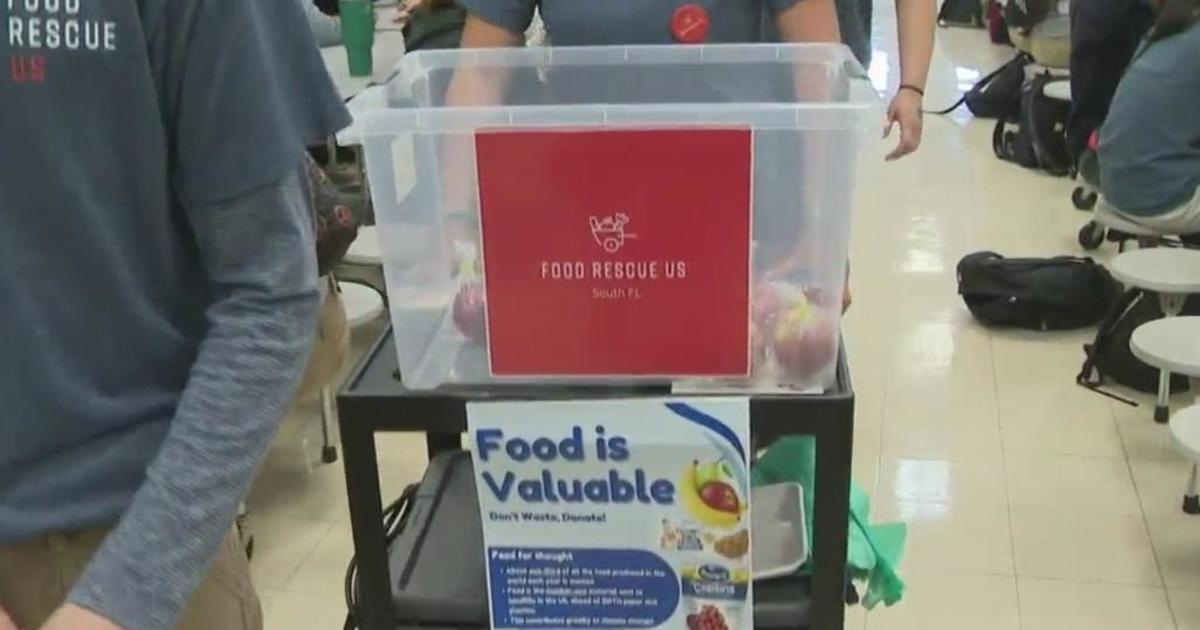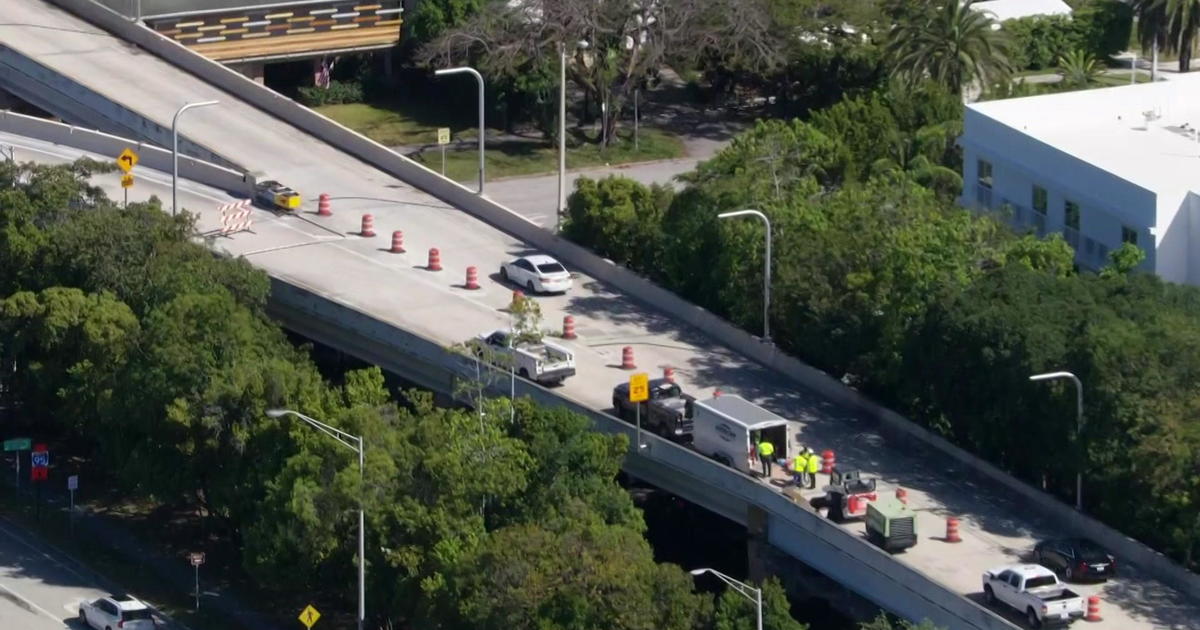Taxi Cab Drivers' Extreme Working Conditions
MIAMI (CBS4) – Some of Miami's taxi drivers feel as if they work under "slave conditions."
They said they work long hours, don't receive enough income and want to see a difference in the way the transportation system works in South Florida.
But not everyone agrees with their fight for a change.
Miami-Dade taxi driver Miguel Lantigua gave CBS4's David Sutta a rundown of what his typical day is like.
Lantigua wakes up at 5 a.m. each morning and heads in to what could be a hectic day at work.
"We haven't started working yet but [I] have a debt of $150 a day, so we have to come out early and spend as much time as we can on the streets because that is the only way that we can afford to pay the lease, pay the gas and make something for ourselves," said Lantigua.
What most people don't know, is that the cabs seen on the road are bought or rented by the driver. They pay for the equipment inside, the paint on the outside with a company logo and rent a piece of paper called a medallion that allows them to drive. Drivers pay between $90 and $120 a day for the medallion.
And all of that money goes to investors.
After Lantigua arrived at the airport's taxi waiting lot, he pulled out a pillow and settled down in his backseat.
"I finish sleeping at the lot because there is an average time waiting there of two hours," said Lantigua.
Just after 7 a.m. Lantigua's number was called. He then went and knocked on doors of the other drivers to wake them up as well. About a half hour later, Lantigua got his first fare to Dadeland Mall.
Lantigua said he pays $100 a day to rent his medallion, on top of gas, tolls and insurance. Luckily, he owns the car.
After his first trip of the day, with tolls and taxi lot fees, he made $35 with $101 more to go, just to cover his expenses.
As he headed back to the lot, Lantigua battled rush hour traffic.
"I was lucky I got here in time," he said as he pulled into the lot.
The lot was fully loaded with 300 cabs. Lantigua had to wait another two hours in line for his second fare.
"Right now this day hasn't been the best because it's taking too long to get a job at the airport. So that is not good," said Lantigua.
Around 11 a.m. he made a quick trip over to the Dolphin Mall. By this time, Lantigua has driven for eight hours and made just $61 dollars.
After he takes into account his expenses for the day he may just break even.
"That's what happens most of the time. Sometimes you even have to take money out of your pocket," said Lantigua as he shrugged.
Meanwhile, across town, veteran driver Jeffrey Radlein was calling it a day.
Unlike Lantigua, he has made plenty of money for the day. How? Radlein is one of 600 drivers who own his medallion, so he doesn't pay rent.
"I did this for 25 years before I could even qualify to buy one. I did the same thing. I worked, I paid a lease and I played by the rules," said Radlein.
On the open market, Radlein's medallion is worth between $300,000 and $400,000 which is a price most drivers can't afford, so they rent them from investors. In Miami-Dade that's roughly 70 percent of the drivers.
"We have to basically pay for everything," said Lantigua.
Drivers like Lantigua are now pushing for reforms and recently protested at the airport over it.
The drivers are backing a major effort to bring a company called Uber to town. The company utilizes a smart phone app that lets you quickly dial-up car service and pay via credit card. With an unlimited amount of permits, drivers could ditch their medallion rental fees, their old taxis and let the free market dictate what will happen.
Lantigua thinks it's a great idea but Radlein, the medallion owner, thinks it's unfair.
"This pie is only so big. Why decimate an industry that you created with the investments of many people, like myself and others, who are now paying off mortgages for $200,000 to 300,000," said Radlein.
Meanwhile, commissioners are pushing an additional proposal backed by the mayor that would require airport and seaport cabs to accept credit cards, upgraded dress codes and new cars.
"At the end of the day it's impossible for drivers like me or drivers like Joe to buy a $30,000 car. To put it in the streets and at the same time pay the $600 permits every week, that's not going to happen," said Lantiua. "It's impossible, even though we want to do it."
"There is no one magic bullet. Dade County has dug themselves into a bit of a mess of the transportation business here and one of the biggest problems is they keep making up the rules as the game is played," said Lantigua.
As the afternoon wore on, flights from Europe came in and Lantigua received a $37 fare to North Miami.
But he soon realized the long trip will cost him.
"There are a lot of cars now," said Lantigua as he passed into the airport's entrance.
When he pulled around the corner, he noticed that the taxi lot was full, so Lantigua had to drive around, waiting for a friend to call and let him know the lot is back open. Finally, the call came in.
"Go, go, go, go!" the caller shouted.
All of a sudden, cabs from all directions around the airport raced toward the taxi lot and Lantigua got in on time. It's a premium time to be at the airport, the lot waits are now just an hour long.
He then booked a couple quick trips to Miami Beach.
At 5:30 p.m., exactly 12 hours after Lantigua got to the lot, he earned about enough money to cover his rent but he still has to pay for gas, plus he probably would like to make a dollar. So Lantigua works into the night shift.
"I saw the sunrise and now I'm seeing the sunset," he said as he drove back from Miami Beach.
The beautiful sunset over the skyline is nice, but Lantigua said he would rather be home with his kids. He picks up his final fare at around 8 p.m., fills up his car for the next day and then does the math; Lantigua made $191. After the $100 rent and $36 for gas, he had $55 dollars left over; a 16-hour day for $55 dollars. Disappointed, he started his car up and shrugged it off.
"Hopefully tomorrow is a better day," said the exhausted Lantigua.
Marcos Feldman with Florida International University's Center for Labor Studies and Research conducted a study on drivers.
"We are finding that drivers are making about five and half dollars an hour," said Feldman.
That's the preliminary results from his study. Based on what he's seen, Feldman believes that if the county wants better taxi service they need to start with the working conditions.
"You wouldn't go into a restaurant and expect in a place where waiters are potentially sleeping the kitchen of the restaurant, because they are working there 22 hours a day, to be providing charming and overwhelmingly 21st century service," said Feldman. "The same argument has to be true for the taxi industry."
Feldman believes the solution is giving renting drivers the ability to own their permits which will essentially take the taxi companies and medallion owners out of the mix. Radlein finds that unfair to those who paid for the permits.
"Mama said all that glitters is not gold and there are many, many unknowns. And that is not the answer," said Radlein.
Would it be a bad thing to have permits for all drivers?
"It would certainly boost drivers working conditions, improve the service to the public and to visitors in Miami," said Feldman. "The argument that you are taking our profit, you are taking our earning in a legitimately open free market doesn't hold up because it's not a free market. It's a totally regulated market."
After 16 hours, Lantigua made just $3.43 an hour, which is less than half of minimum wage.
His wife met him in the driveway to ask how his day was.
"Long day," he responded.
"Yeah, I hear you," she said.
Lantigua went inside to see his family for a couple hours before he'd have to nod off and do it all over again in just seven hours.
"Even though we don't have a lot of time to share together the little time that we have is really beautiful," said Lantigua.
Like many cab owners, Lantigua works seven days a week. If he wanted to take a day off he would have to pay for it because the rent still has to be paid.
Lantigua said that he will be one of hundreds of drivers lined up at a County Hall Wednesday, as the commission debates what to do.



